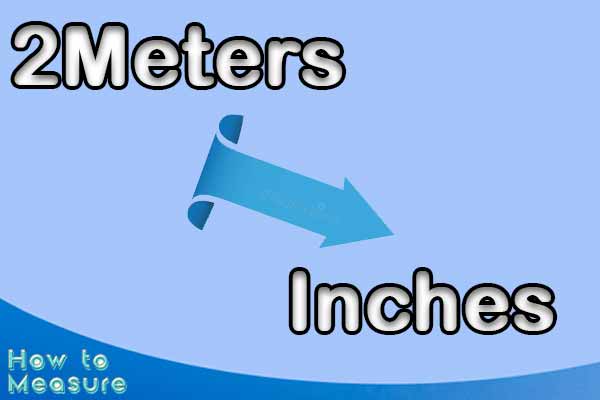Welcome to our conversion guide! We will explore converting a measurement from meters to inches in this particular segment. Conversion between different units of length is a common requirement in various fields, such as engineering, construction, and everyday life. Whether you’re working on a project or simply curious about the imperial system, understanding how to convert meters to inches can prove invaluable.
This introductory section will focus on converting 2 meters to inches. By delving into the relationship between these two units of length, we’ll uncover a simple method for the conversion. Additionally, we’ll discuss the historical context of the metric and imperial systems to provide a broader understanding of the topic.
So, if you’re ready to dive into the world of unit conversion and discover how to transform meters into inches, let’s get started!
Conversion Formula for Converting 2 Meters to inches
To convert 2 meters to inches, you can use the following conversion formula:
inches = meters × 39.37
Applying this formula, we can convert 2 meters to inches:
inches = 2 meters × 39.37 inches ≈ 78.74 inches
Therefore, 2 meters is approximately equal to 78.74 inches.
Please note that the value of 39.37 is an approximation for the conversion factor between meters and inches. The exact conversion factor is 39.3700787 inches per meter. However, using 39.37 usually provides a close enough approximation for practical purposes.
Convert 2 Meters to inches with Our Online Converter
Meter to Inch Converter
If you’re looking for a convenient and reliable way to convert 2 meters to inches, our online converter at “How to Measure” is here to assist you. Our user-friendly tool allows you to effortlessly and accurately convert measurements between different units, including meters and inches.
Within seconds, our online converter will perform the conversion and display the result, showing that 2 meters are equivalent to a specific value in inches.
Our website, “How to Measure” aims to provide accurate and efficient solutions for all your measurement conversion needs. Whether you’re a student, professional, or simply curious about converting units of measurement, our online converter is designed to simplify the process and deliver reliable results.
Visit “How to Measure” today and experience the convenience of our online converter as you effortlessly convert 2 meters to inches and explore a range of other unit conversions.
How to convert 2 meters to inches step-by-step
Converting 2 meters to inches is a straightforward process. Here’s a step-by-step guide to help you with the conversion:
Step 1: Understand the Conversion Factor To convert meters to inches, you need to know the conversion factor between these two units. The conversion factor is 39.37 inches per meter, which means that 1 meter is equivalent to 39.37 inches.
Step 2: Set Up the Conversion Start by writing down the given measurement, which is 2 meters. You’ll use this value in the conversion calculation.
Step 3: Apply the Conversion Formula. Multiply the value in meters by the conversion factor to obtain the equivalent measurement in inches. In this case, multiply 2 meters by 39.37 inches/meter:
2 meters × 39.37 inches/meter = 78.74 inches
Step 4: Interpret the Result The result of the conversion is 78.74 inches. This means that 2 meters is equal to 78.74 inches.
Step 5: Round the Result (Optional). If you need a rounded or simplified value, you can round the result to a desired number of decimal places. For example, rounding 78.74 inches to two decimal places gives you 78.74 inches.
By following these steps, you can convert 2 meters to inches accurately. Remember, using the correct conversion factor and ensuring the units are aligned properly for a successful conversion is important.
Common uses for converting 2 meters to inches in everyday life
Converting 2 meters to inches can be useful in various everyday life scenarios. Here are some common examples of where this conversion might come in handy:
- Home Improvement Projects: When working on home improvement projects, such as measuring for furniture, curtains, or wall hangings, knowing the length in inches can help ensure accurate fittings. Converting 2 meters to inches allows you to determine the appropriate size for items within the available space.
- Sewing and Tailoring: If you enjoy sewing or need to alter clothing, having measurements in inches is essential. Converting 2 meters to inches enables you to translate patterns or measurements accurately, ensuring a proper fit for garments or other sewing projects.
- Travel Planning: When planning international travel, it can be helpful to understand the dimensions of luggage restrictions in inches. Converting 2 meters to inches allows you to determine if your bags meet the required size limitations imposed by airlines or transportation authorities.
- Sports and Fitness: In sports and fitness activities, measurements are often referenced in metric and imperial units. For example, the long jump and high jump distances are commonly measured in inches in track and field events. Converting 2 meters to inches provides a quick reference for such measurements.
- Interior Design and Decorating: Interior design often involves working with measurements in both metric and imperial systems. Converting 2 meters to inches helps with tasks such as determining furniture dimensions, selecting artwork sizes, or estimating the wallpaper or paint area coverage.
- DIY Projects: Whether building shelves, constructing a fence, or engaging in other do-it-yourself projects, having measurements in inches can be beneficial. Converting 2 meters to inches allows you to follow plans or measurements provided in the imperial system, making it easier to execute your projects accurately.
- Architecture and Construction: In architecture and construction, it is common to encounter metric and imperial units. Converting 2 meters to inches helps architects, engineers, and construction professionals communicate and work with measurements effectively, particularly when collaborating on diverse measurement systems.
These examples illustrate the practicality and relevance of converting 2 meters to inches in everyday life. Understanding this conversion allows for seamless integration between metric and imperial systems, enabling smoother communication and precise measurements in various situations.
Conclusion
In conclusion, converting 2 meters to inches is a simple and useful process that finds applications in everyday life. Whether you’re involved in home improvement projects, sewing, travel planning, sports, interior design, DIY projects, or professional fields like architecture and construction, understanding the conversion from meters to inches allows for accurate measurements and seamless communication between metric and imperial systems.
By following the step-by-step conversion process or utilizing online converters, you can confidently determine that 2 meters are approximately equal to 78.74 inches. This knowledge empowers you to make informed decisions, ensure proper fittings, and effectively work with measurements in the imperial system.
The ability to convert between different units of length opens up a world of possibilities, enabling you to navigate diverse measurement systems and bridge the gap between metric and imperial units. Whether you’re a hobbyist, professional, or someone who wants to understand measurements in everyday life, mastering the conversion from 2 meters to inches is a valuable skill.
So, the next time you encounter a measurement in meters and need to relate it to inches, you can confidently apply the conversion formula or rely on online tools to obtain accurate and precise results.











